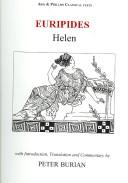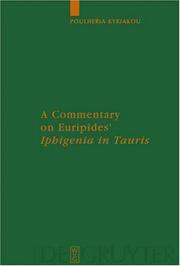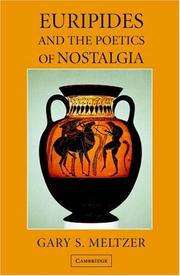| Listing 1 - 10 of 71 | << page >> |
Sort by
|
Book
ISBN: 9783110796940 3110796945 Year: 2022 Publisher: Berlin De Gruyter
Abstract | Keywords | Export | Availability | Bookmark
 Loading...
Loading...Choose an application
- Reference Manager
- EndNote
- RefWorks (Direct export to RefWorks)
Euripides --- Ėvripid --- Yūrībīdīs --- Euripide --- Euripedes --- Eŭripido --- Eurypides --- Euripidesu --- אוריפידס --- エウリーピデース --- Εὐριπίδης

ISBN: 0856686506 0856686514 Year: 2007 Publisher: Warminster Aris and Phillips
Abstract | Keywords | Export | Availability | Bookmark
 Loading...
Loading...Choose an application
- Reference Manager
- EndNote
- RefWorks (Direct export to RefWorks)
Helen of Troy (Greek mythology) --- Euripides --- Ėvripid --- Yūrībīdīs --- Euripide --- Euripedes --- Eŭripido --- Eurypides --- Euripidesu --- אוריפידס --- エウリーピデース --- Εὐριπίδης --- Criticism and interpretation.
Book
ISBN: 9004282610 9789004282612 9789004282605 9004282602 132230985X Year: 2015 Publisher: Leiden
Abstract | Keywords | Export | Availability | Bookmark
 Loading...
Loading...Choose an application
- Reference Manager
- EndNote
- RefWorks (Direct export to RefWorks)
Long, stichomythic dialogues in the tragedies of Euripides are connected with some of the greatest problems of critical appreciation. The form is considered unnatural particularly when characters use stichomythia to tell stories to each other. In Shared Storytelling in Euripidean Stichomythia Liesbeth Schuren tries to rehabilitate Euripidean stichomythia, using pragmatic and narratological approaches. In the section devoted to pragmatic analysis, comparison between the turn-taking systems in Euripidean stichomythia and naturally occurring conversation establishes to what extent convention and realism are operative. Using narratological arguments, the traditional apparatus is expanded to suit the dialogic nature of narrative stichomythia. Analysis of narrative presentation in storytelling with two interlocutors results in a multi-faceted perspective, an effect unique to narrative stichomythia.
Stichomythia. --- Dialogue --- Euripides --- Ėvripid --- Yūrībīdīs --- Euripide --- Euripedes --- Eŭripido --- Eurypides --- Euripidesu --- אוריפידס --- エウリーピデース --- Εὐριπίδης --- Criticism and interpretation.
Book
ISBN: 3110831945 9783110831948 9783110011937 311001193X 1306400961 Year: 2011 Publisher: Berlin Boston
Abstract | Keywords | Export | Availability | Bookmark
 Loading...
Loading...Choose an application
- Reference Manager
- EndNote
- RefWorks (Direct export to RefWorks)
Greek drama (Tragedy) --- Manuscripts, Greek --- Criticism, Textual. --- Euripides --- Ėvripid --- Yūrībīdīs --- Euripide --- Euripedes --- Eŭripido --- Eurypides --- Euripidesu --- אוריפידס --- エウリーピデース --- Εὐριπίδης
Book
ISBN: 1316530221 1107647797 Year: 2013 Publisher: Cambridge : Cambridge University Press,
Abstract | Keywords | Export | Availability | Bookmark
 Loading...
Loading...Choose an application
- Reference Manager
- EndNote
- RefWorks (Direct export to RefWorks)
Originally published in 1954, this book examines dramaturgical elements of three Euripidean plays: The Bacchae, Hippolytus and Suppliant Women. Norwood takes a character-driven approach to Euripides' dramas, while also examining practical problems such as the arrangement of the chorus. This book will be of value to Classicists and anyone with an interest in ancient Greek drama.
Mythology, Greek, in literature. --- Tragedy. --- Drama --- Euripides --- Ėvripid --- Yūrībīdīs --- Euripide --- Euripedes --- Eŭripido --- Eurypides --- Euripidesu --- אוריפידס --- エウリーピデース --- Εὐριπίδης --- Criticism and interpretation.

ISBN: 3110190990 9783110190991 9783110926606 3110926601 Year: 2006 Volume: 80 Publisher: Berlin de Gruyter
Abstract | Keywords | Export | Availability | Bookmark
 Loading...
Loading...Choose an application
- Reference Manager
- EndNote
- RefWorks (Direct export to RefWorks)
This work is the first major commentary on Euripides' Iphigenia in Tauris to appear in English in more than 65 years. It offers detailed analysis of a fascinating play that scholars so far had considered mainly as a source of information about Athenian cult and viewed as a romantic adventure story with happy end. Apart from including sober assessments of textual, linguistic and metrical problems, the commentary sheds new light on the play's treatment of myth, its intricate structure, presentation of character, and place in Euripides' work. In particular it offers fresh insights into the play's relationship to the literary tradition, especially its treatment of the crimes of the Pelopids, and its presentation of the complex, ambiguous relationship of humans and gods as well as that of Greeks and barbarians. Unlike most other tragedies, Iphigenia in Tauris does not feature any villain and avoids concentrating on past crimes and their corrosive influence on the characters' present. The Taurians are not portrayed simply as savage and slow barbarians and Iphigenia, the most intelligent character, fails to transcend her limitations. Religion and cult in both myth and contemporary Athens are a mixture of traditional and invented elements and the play as a whole turns out to be an intriguing and unique experiment in Euripides' career.
Greek drama (Tragedy) --- History and criticism. --- Euripides. --- Euripides --- Criticism and interpretation. --- Ėvripid --- Yūrībīdīs --- Euripide --- Euripedes --- Eŭripido --- Eurypides --- Euripidesu --- אוריפידס --- エウリーピデース --- Εὐριπίδης --- History and criticism --- Antiquity. --- Iphigenia. --- drama. --- myth.
Book
ISSN: 03425991 ISBN: 9783769616507 3769616502 Year: 2009 Volume: 2009 (2) Publisher: München Verlag der Bayerischen Akademie der Wissenschaften
Abstract | Keywords | Export | Availability | Bookmark
 Loading...
Loading...Choose an application
- Reference Manager
- EndNote
- RefWorks (Direct export to RefWorks)
Anthropology --- Euripides --- Criticism and interpretation --- Anthropology. --- Criticism and interpretation. --- Human beings --- Ėvripid --- Yūrībīdīs --- Euripide --- Euripedes --- Eŭripido --- Eurypides --- Euripidesu --- אוריפידס --- エウリーピデース --- Εὐριπίδης --- Primitive societies --- Euripides - Criticism and interpretation --- Social sciences
Book
ISBN: 9780199657834 0199657831 0191745391 0191632031 9780191745393 9780191632037 Year: 2013 Publisher: Oxford Oxford university press
Abstract | Keywords | Export | Availability | Bookmark
 Loading...
Loading...Choose an application
- Reference Manager
- EndNote
- RefWorks (Direct export to RefWorks)
A detailed study of the self-conscious narrative devices within Euripidean drama and how these are interwoven with issues of thematic importance, social, theological, or political. Torrance argues that Euripides employed a complex system of metapoetic strategies in order to draw the audience's attention to the novelty of his compositions.
Euripides --- Euripide, --- Criticism and interpretation. --- Critique et interprétation --- Euripides, --- Poetics --- Poetry --- Technique --- Technique. --- Poetics. --- Ėvripid --- Yūrībīdīs --- Euripide --- Euripedes --- Eŭripido --- Eurypides --- Euripidesu --- אוריפידס --- エウリーピデース --- Εὐριπίδης
Multi
ISBN: 9783110468618 3110468611 3110471396 3110470675 9783110471397 9783110470673 Year: 2016 Volume: Band 19 Publisher: De Gruyter
Abstract | Keywords | Export | Availability | Bookmark
 Loading...
Loading...Choose an application
- Reference Manager
- EndNote
- RefWorks (Direct export to RefWorks)
This edition contains the Greek text of the scholia (vetera and recentiora) and the glosses to Euripides' Hippolytus with a critical apparatus and an apparatus of loci similes. Before the text comes an introduction consisting of two chapters: the former sketches out the history of the exegesis and critical interpretation of the Euripidean text in antiquity as well as the creation and development of this scholiastic corpus, while the other investigates more accurately the manuscripts and the medieval and Renaissance tradition of the scholia to the tragedy. At the end I added the edition of the Triclinian scholia to Hippolytus from Laur. 32.2 together with a metrical apparatus of the choral sections and then a Humanistic paraphrasis, which can be found in Mon. Gr. 258. The purpose of this work is to improve Schwartz's edition both in recensio and constitution of the text. About what concerns the recensio, this was extended to sixteen manuscripts instead of the four used by Schwartz. The reassessment involved not only the more recent manuscripts but also some witnesses dating to the Palaeologan age, disregarded or only partially collated by the former editor.
Euripides. --- Euripides --- Hippolytus (Euripides) --- Euripide --- Scholia. --- Criticism --- Philology --- Ėvripid --- Yūrībīdīs --- Euripedes --- Eŭripido --- Eurypides --- Euripidesu --- אוריפידס --- エウリーピデース --- Εὐριπίδης --- Hippolytos (Euripides) --- Euripidou Hippolytos (Euripides) --- Crowned Hippolytus (Euripides) --- Hippolytos stephanēphoros (Euripides) --- Hippolytus. --- Triclinius.

ISBN: 9780521858731 0521858739 9780511497780 9781107407251 0511249993 9780511249990 9780511250507 0511250509 9780511248931 0511248938 1280703512 9781280703515 9786610703517 6610703515 0511497784 1107407257 1107167078 9781107167070 0511318537 9780511318535 0511249489 9780511249488 Year: 2007 Publisher: Cambridge Cambridge university press
Abstract | Keywords | Export | Availability | Bookmark
 Loading...
Loading...Choose an application
- Reference Manager
- EndNote
- RefWorks (Direct export to RefWorks)
Branded by critics from Aristophanes to Nietzsche as sophistic, iconoclastic, and sensationalistic, Euripides has long been held responsible for the demise of Greek tragedy. Despite this reputation, his drama has a fundamentally conservative character. It conveys nostalgia for an idealized age that still respected the gods and traditional codes of conduct. Using deconstructionist and feminist theory, this 2006 book investigates the theme of the lost voice of truth and justice in four Euripidean tragedies. The plays' unstable mix of longing for a transcendent voice of truth and skeptical analysis not only epitomizes the discursive practice of Euripides' era but also speaks to our postmodern condition. The book sheds light on the source of the playwright's tragic power and enduring appeal, revealing the surprising relevance of his works for our own day.
Justice in literature. --- Justice in literature --- Euripides --- Criticism and interpretation. --- Criticism and interpretation --- Ėvripid --- Yūrībīdīs --- Euripide --- Euripedes --- Eŭripido --- Eurypides --- Euripidesu --- אוריפידס --- エウリーピデース --- Εὐριπίδης --- Arts and Humanities --- History --- Euripides - Criticism and interpretation
| Listing 1 - 10 of 71 | << page >> |
Sort by
|

 Search
Search Feedback
Feedback About UniCat
About UniCat  Help
Help News
News